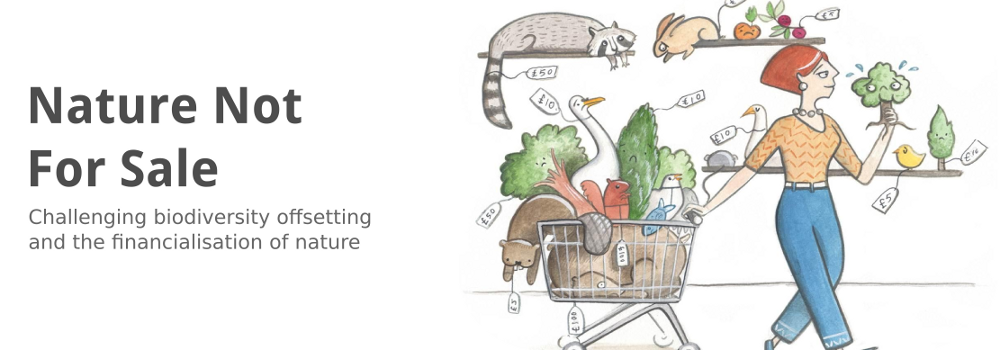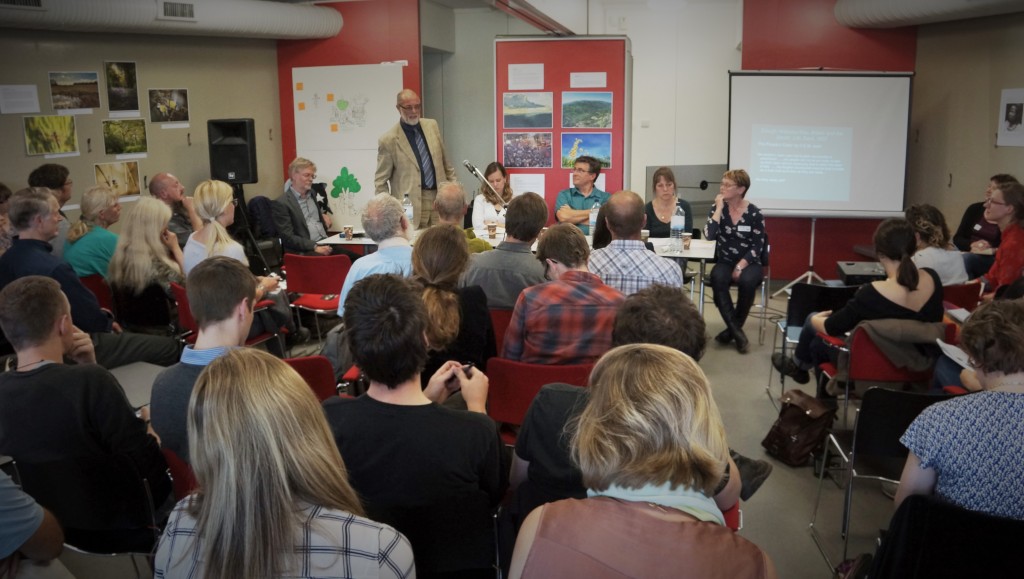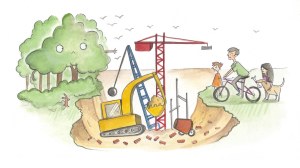This declaration has been signed by over 150 organisations from across the world. You can read the full list of signatories here.
The statement is open for signatures from organizations, groups, networks, associations, and collectives – if you would like to sign up just email nobiodiversityoffsets@gmail.com.
You can read more at the ‘No to Biodiversity Offsets‘ website.
Declaration on Biodiversity Offsetting
Around the world, ecosystems and the communities that depend on them are harmed by large infrastructure projects, extractive industries and new financial markets.[1] To facilitate these activities, public and private entities are promoting new schemes to allow their environmental impacts to be ‘offset’. This could lead to an increase in damage, but even more concerning is that it commodifies nature. This is why the undersigned organisations are warning the world of the negative impacts of this false solution and saying “No to Biodiversity Offsetting.”
Biodiversity offsetting is the promise to replace nature destroyed and lost in one place with nature somewhere else. As with the Clean Development Mechanism (CDM) and schemes to Reduce Emissions from Deforestation and Forest Degradation (REDD), biodiversity offsetting relies on ‘experts’ to create dubious calculations that claim to make one piece of the earth equal to another. It pretends you can trade places.
Who really benefits?
The introduction of biodiversity offsetting allows, or even encourages, environmental destruction with the promise that the habitat can be recreated elsewhere. This is beneficial to the companies doing the damage, since they can present themselves as a company that invests in environmental protection, thereby green-washing its products and services.
It also creates new business opportunities for intermediaries: conservation consultants to calculate what is lost, bankers to turn them into credits, traders to barter and speculate on them in new specialised markets and investors who want to profit from so called ‘natural capital’. “Natural capital” is an artificial concept based on questionable economic assumptions rather than ecological values that permits the commodification of nature.
All of this is happening with the strong involvement of state governments who are creating public policies to ensure that property rights over elements of nature such as carbon or biodiversity can be transferred to corporations and banks.
Biodiversity offsetting won’t prevent biodiversity loss
Nature is unique and complex. It is impossible to fully measure biodiversity, so suggestions that equivalent natural areas can be found is a fallacy. Some ecosystems take hundreds, even thousands of years to reach their current state – yet biodiversity offsetting pretends that a replacement can be found. Extensive research shows this is impossible.[2]
Biodiversity offsetting will harm communities
Biodiversity offsetting means environmental protection becomes a mere by-product of a commercial project, marginalising communities and threatening their right to life. Nature has an important social, spiritual and sustenance role for local communities, who define their territories through a balanced and historical relationship with land and nature. These values cannot be measured, priced nor offset any more than communities can simply move and live elsewhere.[3]
Biodiversity offsetting attempts to separate people from the environment in which they live, where their culture is rooted, where their economic activities have been traditionally taking place.
Biodiversity offsetting could increase biodiversity loss
Past cases of biodiversity offsetting shows how it opens up natural resources to further exploitation, and undermines communities’ rights to be able to manage and protect the natural commons. Examples include:
The new Forest Code in Brazil which allows land-owners to destroy forests if they buy ‘certificates of environmental reserves’ which are issued by the state and traded on BVRio, the ‘green stock market’ recently established by the government of Brazil.
The planned EU legislation on biodiversity offsetting (the so called “No Net Loss Initiative”) which could undermine existing environmental directives.
Public finance institutions such as the World http://buylevitra.net/levitra-suitable-men-diabetes-high-blood-pressure/ Bank, the International Finance Corporation (IFC, the World Bank private sector arm) and the European Investment Bank (EIB) are making biodiversity offsetting part of their standards and practices, permitting increased levels of offsetting to ‘compensate’ for the permanent environmental damage caused by the projects that they finance.
Destructive large infrastructure and extraction projects cannot be offset. Once an ecosystem is destroyed, it cannot be recreated elsewhere. In many places where biodiversity offsetting has been allowed, it has weakened existing laws to prevent destruction. If trading occurs (as it does with carbon offsetting), it paves the way for speculation by financial actors and private companies, threatening nature and the rights of communities dependent on it.
After seven years of carbon offsetting that has failed to reduce carbon emissions,[4] biodiversity offsetting should not be used to allow destruction that would have been illegal or contrary to local and national policy under environmental legislation or investment standards.
For these reasons, we reject any attempts to include biodiversity offsetting in any legislation, standards or public policies aimed at the creation of new markets with nature or ‘natural capital’ accounting.
Annex: some examples of Offsetting policies and projects
1. The UK government is planning to introduce biodiversity offsetting (the consultation is open until 7 November 2013). Initial offset cases show that the promise to ‘offset biodiversity’ is undermining planning laws that prevent destruction. Biodiversity offset providers are successfully interfering in the legislative process, undermining the democratic decision-making process and weakening the voice of communities.[5]
2. Notre Dame des Landes, France: a proposed airport that has been in pipeline for the past 40 years, to be built on over 1000 hectares (ha) of wetland, where farmers have been maintaining a traditional landscape and maintaining biodiversity. Offsetting was required by French biodiversity and water laws. ‘Biotope’ engineered a new methodology based on ‘functions’ rather than ‘hectares’, proposing that Vinci, the airport developer, offset only 600 ha. Local resistance against offsetting has so far prevented the project and challenged the proposed offsetting scheme. The European Commission is now intervening.
3. EU Biodiversity strategy 2020 – the EU is considering the possibility of legislation on biodiversity offsetting, which could include a “habitat bank” to permit offsetting species and habitats across EU borders. The aim is for no net loss of biodiversity, an important difference to the previous aim of no loss.
4. The World Bank has financed the large Weda Bay nickel and cobalt mining project in Indonesia. It is operated by the French mining company Eramet. The company is part of the BBOP (Business and Biodiversity Offsets Program).The project has already received a guarantee from MIGA (the World Bank arm covering the guarantee of economic and political risk of investors), and is supposed to receive new financing from the World Bank, the Asian Development Bank, the Japan Bank for International Cooperation (JPIC), Coface and French Development Agency (AFD) for offsetting programme. The impacts on people and territories are massive and they are opposed by Indonesian and international civil society.
Notes
[1] Mining, energy, industrial logging, monoculture plantation and transport mega-projects are leading to increased land expropriation and land-use change, including the conversion of forests into industrial-scale agriculture. At the same time, in the name of energy security, large-scale efforts are underway to increase the extraction of conventional and unconventional fossil fuels, such as tar sands and shale gas.
[2] http://www.ceeweb.org/wp-content/uploads/2011/12/Critical-review-of-biodiversity-offsets_for-IEEP_Final.pdf
[3] The disproportional and unjust burden of false solutions/offsettings to the most vulnerable communities, that are not responsible for environmental destruction, and whose livelihoods are directly dependent on a healthy environment and on the possibility to interact with it.
[4] http://scrap-the-euets.makenoise.org/english/
[5] http://saveourwoods.co.uk/articles/nppf/biodiversity-offsetting-permits-previously-rejected-housing-development/
[6] See briefing by Les Amis de la Terre here: http://www.amisdelaterre.org/Mine-de-nickel-Weda-Bay-d-Eramet.html



 A new conservation paradigm is emerging among policy makers; that in order to properly protect nature, it must be given a ‘proper value’. This usually means setting up ways to measure ecosystems and biodiversity in terms of pounds, dollars and euros so that nature, industry and economic growth can all appear on the same balance sheet.
A new conservation paradigm is emerging among policy makers; that in order to properly protect nature, it must be given a ‘proper value’. This usually means setting up ways to measure ecosystems and biodiversity in terms of pounds, dollars and euros so that nature, industry and economic growth can all appear on the same balance sheet.